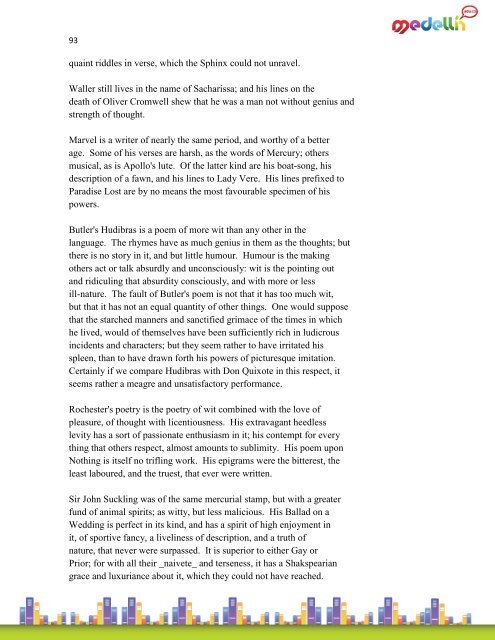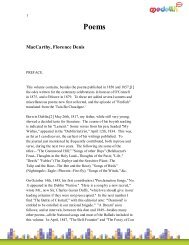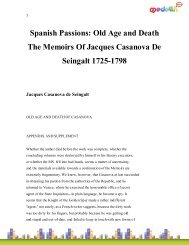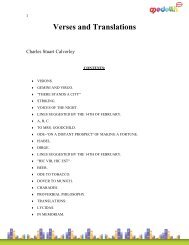Lectures On The English Poets William Hazlitt
Lectures On The English Poets William Hazlitt
Lectures On The English Poets William Hazlitt
Create successful ePaper yourself
Turn your PDF publications into a flip-book with our unique Google optimized e-Paper software.
93<br />
quaint riddles in verse, which the Sphinx could not unravel.<br />
Waller still lives in the name of Sacharissa; and his lines on the<br />
death of Oliver Cromwell shew that he was a man not without genius and<br />
strength of thought.<br />
Marvel is a writer of nearly the same period, and worthy of a better<br />
age. Some of his verses are harsh, as the words of Mercury; others<br />
musical, as is Apollo's lute. Of the latter kind are his boat-song, his<br />
description of a fawn, and his lines to Lady Vere. His lines prefixed to<br />
Paradise Lost are by no means the most favourable specimen of his<br />
powers.<br />
Butler's Hudibras is a poem of more wit than any other in the<br />
language. <strong>The</strong> rhymes have as much genius in them as the thoughts; but<br />
there is no story in it, and but little humour. Humour is the making<br />
others act or talk absurdly and unconsciously: wit is the pointing out<br />
and ridiculing that absurdity consciously, and with more or less<br />
ill-nature. <strong>The</strong> fault of Butler's poem is not that it has too much wit,<br />
but that it has not an equal quantity of other things. <strong>On</strong>e would suppose<br />
that the starched manners and sanctified grimace of the times in which<br />
he lived, would of themselves have been sufficiently rich in ludicrous<br />
incidents and characters; but they seem rather to have irritated his<br />
spleen, than to have drawn forth his powers of picturesque imitation.<br />
Certainly if we compare Hudibras with Don Quixote in this respect, it<br />
seems rather a meagre and unsatisfactory performance.<br />
Rochester's poetry is the poetry of wit combined with the love of<br />
pleasure, of thought with licentiousness. His extravagant heedless<br />
levity has a sort of passionate enthusiasm in it; his contempt for every<br />
thing that others respect, almost amounts to sublimity. His poem upon<br />
Nothing is itself no trifling work. His epigrams were the bitterest, the<br />
least laboured, and the truest, that ever were written.<br />
Sir John Suckling was of the same mercurial stamp, but with a greater<br />
fund of animal spirits; as witty, but less malicious. His Ballad on a<br />
Wedding is perfect in its kind, and has a spirit of high enjoyment in<br />
it, of sportive fancy, a liveliness of description, and a truth of<br />
nature, that never were surpassed. It is superior to either Gay or<br />
Prior; for with all their _naivete_ and terseness, it has a Shakspearian<br />
grace and luxuriance about it, which they could not have reached.

















